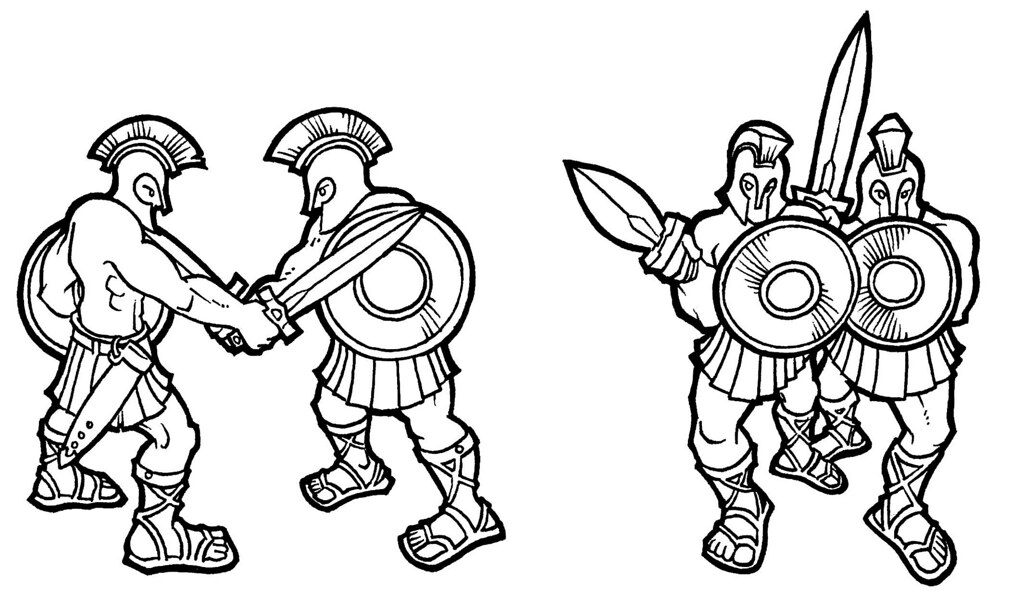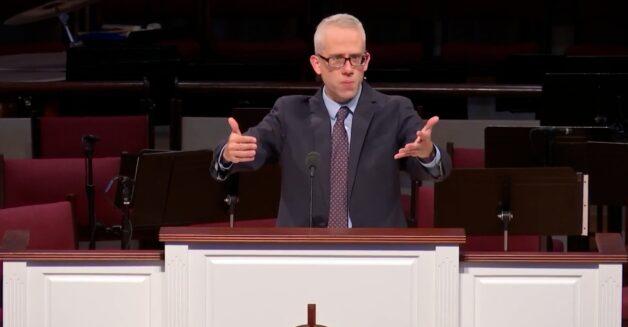
The cross is in view and Jesus takes the last hours with his disciples to talk about the Trinity. It’s not as strange as it sounds. If Jesus is going to die (and later ascend into heaven after his resurrection), it behooves the disciples to understand Christ’s oneness with the Father and the Helper who will come in his absence. Five times in the Upper Room discourse Jesus promises the coming of the Holy Spirit. This is the last of the five passages:
When the Spirit of truth comes, he will guide you into all the truth, for he will not speak on his own authority, but whatever he hears he will speak, and he will declare to you the things that are to come. He will glorify me, for he will take what is mine and declare it to you. All that the Father has is mind; therefore I said that he will take what is mine and declare it to you (John 16:13-15).
Here we have Jesus’ final words about the Holy Spirit. And what does he emphasize as he comes to the cross, but the central and often overlooked work of the Spirit to glorify Christ. Most immediately, Jesus is speaking to the Twelve about the work the Spirit will do in the days ahead to reveal Christ’s full glory to them (John 7:39). But derivatively, Jesus’ promise is also about the work of the Spirit to glorify Christ in our hearts through the truth the disciples would soon see.
This is an important passage because it helps us avoid two common mistakes.
The first mistake is to pit the Spirit v. the Scriptures. Jesus’ promise has nothing to do with the Spirit telling me who I should marry or what job I should take. That’s not what he has in mind when he says the Spirit “will guide you into all truth” (v. 13a). Jesus is talking to the Apostles (v. 12). They are the ones who will be led into “all truth.” And the “all truth” they would receive was not the truth about every bit of knowledge in the universe from supernovas to DNA. The “truth” refers to the whole truth about salvation, everything bound up in Jesus Christ the way, the truth, and the life. The Spirit will illuminate the things that are to come (v. 13b), not in a predictive sense, but in so far as he will unpack the significance of the events yet to come, namely Jesus’ death, resurrection, and exaltation. The Spirit, speaking for the Father and the Son, will help the Apostles remember what Jesus said and understand the true meaning of who Jesus was and what he accomplished (14:26).
This means the Spirit is responsible for the truths the Apostles preached and which, in turn, were written down in what we now call the New Testament. We trust the Bible because the Apostles, and those under the umbrella of their authority, wrote it by means of the Spirit’s revelation. The Bible is the Spirit’s book. He inspired it, not only the Old Testament, as the Apostles assume (Acts 4:25; 28:25; Hebrews 3:7; 2 Peter 1:21), but also the New Testament, as Jesus indirectly promised in John 16.
Therefore, we can yield no ground to those who, like Mormons, argue for on-going revelation that adds to the doctrinal content of the New Testament. Nor can we tolerate the suggestion liberals often make that sticking meticulously to the Scriptures is somehow an insult to the Holy Spirit. Word and Spirit belong inseparably together. We hear from the Spirit when we search the Scriptures. And in searching the Scriptures, we must pray for the Spirit’s illumination.
The second error this passage can help us avoid is the mistake of pitting the Spirit v. Christ. The Holy Spirit is a serving Spirit. He speaks only what he hears (13b). He declares what he is given (14b). His mission is to glorify Another (14a). All three persons of the Trinity are fully God, yet in the divine economy the Son makes known the Father and the Spirit glorifies the Son. Yes, it is grievous to ignore the Holy Spirit and overlook the indispensable role he plays in our lives. But we must not think we can focus on Christ too much. The Spirit is not hurt when fix our attention on Christ. Exulting in Christ is evidence of the Spirit’s work! The focus of the church is not on the dove but on the cross, and that’s the way the Spirit would have it. As J.I. Packer puts it, “The Spirit’s message to us is never, ‘Look at me; listen to me; come to me; get to know me,’ but always, ‘Look at him, and see his glory; listen to him, and hear his word; go to him, and have life; get to know him, and taste his gift of joy and peace.’”
All of this business about the work of the Spirit to reveal and glorify the Son is why the notion of anonymous Christians is so horribly mistaken. I remember a professor in college who argued that because God was sovereign and the Spirit blows where he wishes, the Spirit could very well be savingly at work in all religions, causing people to be born again and joining people to Christ apart from their knowing it. He believed people could be saved in Christ without hearing of Christ or professing faith in him.
This “inclusivist” way of thinking is popular. Even the beloved C.S. Lewis, in his classic Mere Christianity, espoused it:
There are people who do not accept the full Christian doctrine about Christ but who are so strongly attracted by Him that they are His in a much deeper sense than they themselves understand. There are people in other religions who are being led by God’s secret influence to concentrate on those parts of their religion which are in agreement with Christianity, and who thus belong to Christ without knowing it. For example, a Buddhist of good will may be led to concentrate more and more on the Buddhist teaching about mercy and to leave in the background (though he might still say he believed) the Buddhist teaching on certain other points.
I’ve benefited from Lewis often, but to think this way is to misunderstand the Spirit’s mission, at Pentecost and in the age of Pentecost. The work of the Holy Spirit is to bring glory to Christ by taking what is his–his teaching, the truth about his death and resurrection–and making it known. The Spirit does not work indiscriminately without the revelation of Christ in view. Arguably, the Holy Spirit’s most important work is to glorify Christ, and he does not do this apart from shining the spotlight on Christ for the elect to see and savor.



